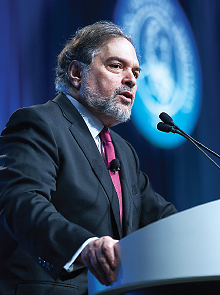Summergrad Says Psychiatry Has ‘Once-in-a-Generation’ Opportunity
Abstract
The incoming APA President calls on members to speak up for science, advocate for patients, communicate with the public, and embrace a global role in mental health leadership.
Psychiatry, psychiatric patients, and APA are all at a turning point, incoming APA President Paul Summergrad, M.D., said during his address at the Opening Session of APA’s 2014 annual meeting in May. Increased public attention to mental health, extraordinary scientific opportunities, and the unfolding of health care reform mark this as a crucial time in history, he stated.

Incoming APA President Paul Summergrad, M.D., said the convergence of scientific discovery, intense public interest in psychiatry, and health care reform policies makes for a transformative moment in mental health history.
“We are in a unique period in the history of psychiatry,” he said. “The recognition and understanding that psychiatric illnesses are the most common disabling and preeminent disorders of young people is now widespread. We are on the cusp of what has been a complex and difficult journey to discover the fundamental mechanisms of what have been among the most feared disorders of humankind. . . . As psychiatry stands at a cusp, so does APA. We are the oldest medical specialty organization in the United States and the only one that fully bridges the worlds of medicine and psychiatry. . . . We now have a once-in-a-generation opportunity. We can set a course for our field to allow us to be effective for the next 20 years or we can miss the possibilities embedded in this moment.
“What makes this moment so special?” Summergrad asked. “Mental health today is both in the spotlight and under a microscope. Public interest in mental health issues has never been more intense, triggered in part by events that make for tragic headlines and leave us all sick at heart.”
At the same time, he said, the scientific opportunities available today are unprecedented. “We have never before had the capacity to image the brain, to see the impact of genetic abnormalities on neurodevelopment, or begin to understand the complex ways our brains shape our perceptions of the world and in turn are shaped by them. We also live in a world where health care reform is finally being realized and providing opportunities to fully integrate the care of so many of our patients. . . . These developments are truly once-in-a-lifetime moments that we dare not waste.”
At this crossroads, APA and the profession of psychiatry have several tasks, he said. They are to
Speak up for the science. “This means helping others understand what we know so well as physicians—that these illnesses are real, disabling, and strongly associated with medical comorbidity, but also amenable to care, treatment, and the power of contemporary science,” he said. “To that end, we have a special responsibility to put aside internecine battles, especially those driven by ideology, and go where the science takes us.” | |||||
Advocate for patients and the profession. “Our patients live with stigma, and we do as well,” Summergrad said. “We cannot act in their best interest if we do not speak fully in support of equity and parity. . . . With regard to our research and academic mission, it goes without saying that their future is dependent on our creativity and imagination, and we must continue our vigorous support for them.” | |||||
Find a simple and direct language to communicate among ourselves and with our patients and the American public. “We should take advantage of the increased public interest in mental health and partner with allies in the media to amplify our message,” he said. | |||||
Embrace a role as global leaders in psychiatry. “Many parts of our world are undergoing enormous social, economic, and political development and discovering both the importance of mental health in their own countries, in addition to the burden that the stigma of mental illness places on their populations,” he said. “Colleagues from around the world who are experiencing these cultural upheavals have much to teach us as well.” | |||||
As he concluded, Summergrad looked to the future. “As we set our course to achieve these goals, we must remember that none of these are the work of one president or one board or one moment in time,” he said. “These are the ongoing tasks that must animate this great organization and profession for years to come. None of this will come quickly. Indeed we have already been on a long journey for knowledge and justice. In his quest for civil rights, the words of Martin Luther King Jr., ring just as true about our work today and in the future: ‘The arc of the moral universe is long, but it bends toward justice.’ ” ■
To view a video of an interview with Summergrad by Psychiatric News Editor-in-Chief Jeffrey Borenstein, M.D., click here.



